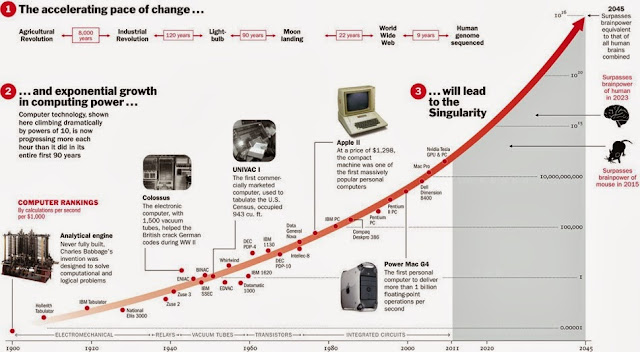James Bedsole’s in depth interview with futurist, inventor and author of The Singularity Is Near: When Humans Transcend Biology, Ray Kurzweil.
This is an old interview full of current information. Chief Editor for Awaken
In the interview, Kurzweil reviews the Law of Accelerating Returns, and the implications of exponential information technologies. Included in the field of information technologies now, he talks of the impact of accelerating change on medicine. “We’ll see dramatic changes in health and medicine ten years from now. We’ll see radical changes twenty years from now,” says Kurzweil. “We need to get to that point.”
 |
| Image Source: TIME |
Expanding the last words of the film, Transcendent Man, “So, does God exist, I would say, not yet,” Kurzweil states:
The different religions of the world have a surprising agreement on what God is. God is an unlimited amount of what: memory, intelligence, creativity and love — basically the highest things a neocortex does. What happens in evolution, entities like mammals and humans become more intelligent, more creative, more loving, and moving exponentially to become more God-like; never quite reaching God, but moving in that direction. So evolution is a spiritual process to bring us closer to God, and technological evolution is now running a million times faster than biological evolution and ultimately we will vastly ultimately trillions-fold expand our creativity and our sense of humor and our ability to love and will become more God-like.
For Kurzweil, we will never really become infinite, but it will seem infinite from today’s perspective.
Kurzweil says the cloud is pure information technology. “It’s doubling in power every year.” The impact of this extending out is that more and more of our thinking will be done in the cloud, and Kurzweil predicts that it will eventually be mostly in the cloud, diminishing the need for biological bodies.
Discussing his project at Google, where he is the Director of Engineering, Kurzweil says he is creating a synthetic neocortex that can understand language just the way a human does. “[It] can read something for meaning, and then end up with a hierarchical structure and its synthetic brain reflects on that meaning. It will greatly enrich the world of search.”
With the ability to scour the web with understanding, Google will become more of a personal assistant, summarizing up-to-the-minute information for you.









































